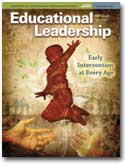In response to “Debating Universal PreK,” which asked, What's preventing universal preK in the United States?
The biggest obstacle to universal preK is logistics. How do states pay for it? How do they decide who can provide it? What qualifications should be required of staff? How will they phase it in? In my home state (New Mexico), we've been growing a program for the last three years, but it's been a slow process, not because of political will, but because we're still in the process of asking those “how” questions.
—Danielle
The best thing that anyone who is interested in this issue can do is get inside a preK classroom. See a great teacher. See what children learn. Witness the benefits firsthand, and take a state legislator or other decision maker with you.
—Maria
The United States has nearly universal preschool right now. The problem is that it is a complex, underfunded, and misunderstood spiderweb of programs and services cobbled together over the years—and it often doesn't reach the children who are most in need. Programs range from the ridiculous to the sublime, with most children in settings that are mediocre or poor.
The United States desperately needs a coherent set of policies that give all its children and their families access to programs and services that will secure their healthy development and enhance their learning.
The growth of the universal preK movement is a welcome and hopeful sign that we are waking up to the importance of the years before kindergarten. But it is not enough if it does not address the strengthening of the entire web of programs and services for children from birth through age 8. There is plenty of room at the table, and I urge ASCD to become more fully engaged in these broader discussions.
—Harriet Egertson
In response to “Most-Clicked: Reading Recovery Is What Works,” which asked, Should states use federal Reading First money to fund Reading Recovery programs?
Why shouldn't we spend federal money on programs that work to keep the lowest-achieving children from being in Title I programs (which use federal funds)? I have worked with Reading Recovery since 1991, and it is the best program I have seen in my 30-year career. Let's put federal money behind the slogan “no child left behind”!
—Pamela Vergona
Absolutely! It's about time that people in the United States figured out that this program works. Now the states need to train more Reading Recovery teachers so that current teachers can take a break. The program is very intense, and teachers should not teach it forever. In New Zealand, teachers teach Reading Recovery for a few years, take a break, and then go back to it.
—Lauren
If federal funds support Reading Recovery, then there should only be a limited percentage of funds allocated to it. Reading Recovery is a kid-by-kid approach, and the United States cannot afford to teach one kid at a time. Other methods that affect multiple students are a better investment of federal funds.
—Marcia
Long overdue is the use of federal funds to support Reading Recovery. All of the components make this an excellent program: one-on-one time, intensive professional development for the teachers, and the instructional strategies used to scaffold student learning. As an intervention, it is outstanding. I strongly believe that all teachers of special education students should be trained in Reading Recovery.
—Lynn Hruschak
It makes sense to use a program with demonstrated effectiveness. The tension arises when staff and parents see the intensive one-on-one program working but question why other students cannot receive the same benefits. It becomes a moral debate about intervention programs, providing effective programs for all, and the purpose of funding special programs.
—Wesley Oginski
I previously worked in a district that benefited from having Reading Recovery teachers train classroom teachers. Reading Recovery teachers are not only a vital resource for struggling students, but also a critical support for teachers.
—Cheryl
Reading Recovery is the most effective reading support program I've been involved in, and I've been involved in many. Definitely federal funds should be used to fund this program. Sadly, in our district, after seven years, Reading Recovery went on the block because of the cost of all the NCLB mandates.
—Barb Faler, Retired, Van Buren Public Schools
